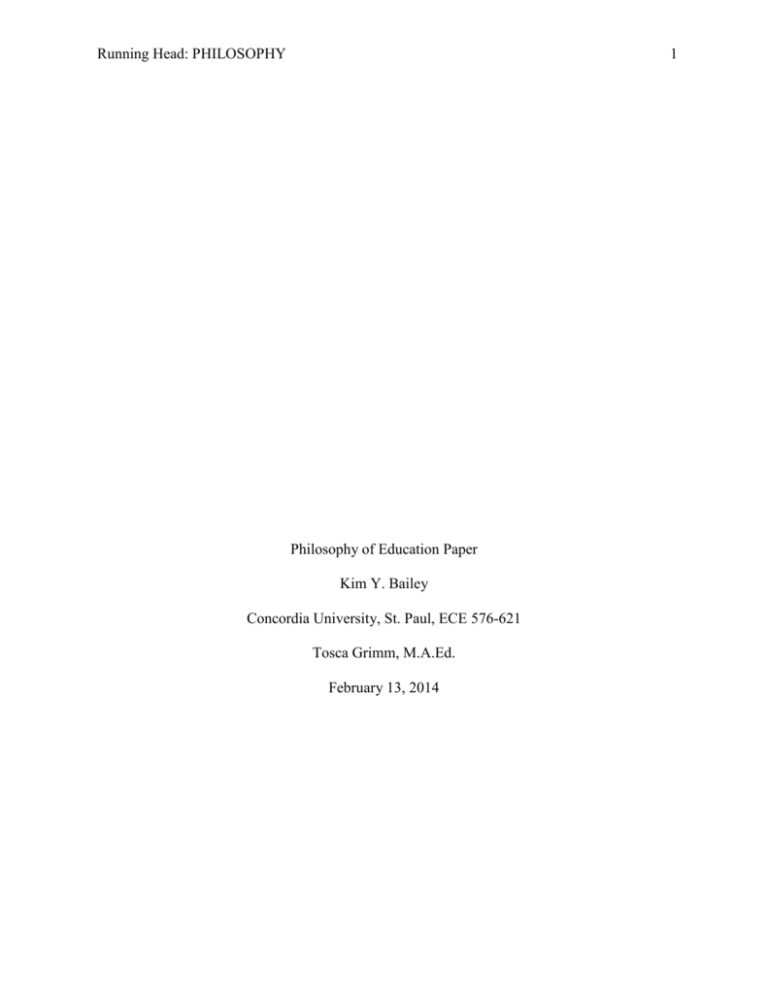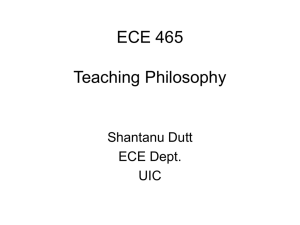Philosophy of Education Paper (2)
advertisement

Running Head: PHILOSOPHY 1 Philosophy of Education Paper Kim Y. Bailey Concordia University, St. Paul, ECE 576-621 Tosca Grimm, M.A.Ed. February 13, 2014 PHILOSOPHY 2 Philosophy of Education In the ten years of teaching in the field of Early Childhood Education (ECE), I have come to understand and know that all children are capable of learning. Children learn through many different ways; most importantly through play. Play supports the growth and learning of children. Play allows children to explore the world and develop new skills. Play is an important and necessary part of childhood and ECE. Play Play is a key component in ECE. Play enhances every aspect of development and learning (Rogers & Sawyers, 1998). The developmental and learning areas that are enhanced from play are social, emotional, cognitive, language, and physical development. Bodrova and Leong (as cited in Heidemann & Hewitt, 2010) believes that while in formal setting children may seem to have challenges. However, when engaged in play, children tend to perform at a higher level set of skills. While in play children show advance skills in language use, memory, selfcontrol, attention, brain development, and social-emotional development. Through play, children develop the following skills: Social Development: Play provides the means and ability for children to interact with others. Through these interactions children learn social skills. Emotional development: Play provided the opportunity for children to express positive and negative emotions. Children may not be able to verbalize their emotions but are able to express their feelings through play. Cognitive Development: Through play, children are able to assign different functions for a single object, children are doing cognitive decentering. Children’s ability to learn cognitive decentering will support their understanding of other people’s perspectives; this PHILOSOPHY 3 provides the ability to work together to coordinate roles and negotiate play scenarios. Children that are capable of coordinating multiple perspectives will develop reflective thinking and metacognition. The ability to also take an object and substitute the object for another object (e.g. a block used as a cell phone to text), contributes to the development of abstract thinking and imagination (Bodrova & Leong, 2003). Language development: Play supports language development. Children are able to practice and build their language skills by communicating through active play with peers and adults. Language and communication development is important during play because children are exploring stories, negotiating roles, expressing feelings, and learning to listen while in conversations with others. Vygotsky (as cited in Berk & Winsler, 2002) believes that language is the primary and universal tool utilized by all humans to communicate or complete an activity by using the brain to create a higher-order and self-regulated process. Physical development: muscles are used during play. Children develop large muscle skills when they reach, walk, run, crawl, and jump. They strengthen small muscles when they use their fingers to grasp, to attempt to write, paint, and explore with manipulative toys (e.g. bristle blocks and Legos). Educators’ Knowledge It's been my experience that teachers with more education or continuing education tend to be more intentional in their teaching of young children. Providers should continue their own education to build a strong foundational knowledge about children and how to appropriately scaffold children’s learning. Continuing education should be done in an accredited institution (e.g. Concordia University-Saint Paul) or accredited training with professional trainers (e.g. PHILOSOPHY 4 Early Childhood Stout Conference). Working in the early childhood education field, it is essential to know how to collect data, record progress and evaluate children's outcomes. Observations Through teaching and taking courses about children I've learned that the best ways to monitor the progress on children's education is through observations; such as anecdotal records of children, portfolios of children's work, pictures and video clips of children at play, screenings and assessment tools such as Teaching Strategies Gold Assessment, The Creative Curriculum Check- list, and Work Sampling. Bredekamp and Rosegrant (as cited in Beneke, Helm, & Steinheimer, 2007) believes that observations and documentation of children are important because of all of the different educational decisions that affect the children. Therefore, by adding intentional observations as part of the everyday curriculum can benefit children, teachers, and parents. Observations should be naturally into the classrooms. Observations can be done by adults or children. When teachers take time to organize and reflect upon documentation; rewards may accrue as to providing quality decision making with greater results for the goals of children and families. Individualization Providers should understand the importance of individual needs and goals. Positive reinforcements should be the number one method when interacting with a child to achieve these needs and goals. It is very true that providers should promote literacy, language, math, science, and sensory into play in the everyday curricula. However, when individualization is involved, each child will have to main tool to success because curricula are now geared toward each individual child and their learning style. To better understand the children to create the individualization, educators need to build a relationship with the family. PHILOSOPHY 5 Relationship Families play a very important role in their child’s education. They are the primary foundational support for the child's education throughout life. A partnership should always be formed between the parent/guardian and teacher when it comes to the well-being of the child. This can be accomplished by providing opportunities for families to volunteer in the classroom, go on fieldtrips, and home involvement work. Clear communication with parents and family is best. The best ways to do this is through conferences, home visits, personal meetings (Individual Education Plans or upon parent requests) and should always include teachers and parents/guardians. Conclusion Providers must understand the importance of relationships because families are the key to the children’s overall success. Educators need to use current research to support methods and theory. Children are different from one another and learn in many different ways. Due to the different level of skills for each individual child, educators must do observations, use them to individualize, and do intentional scaffolding. Individualizing an educational plan will help support children to learn in their own way. Due to the differences of comprehension and understanding from each child; the focus of education should be based upon nurturing the whole child. PHILOSOPHY 6 References Beneke, S., Helm, J.H., & Steinheimer, K. (2nd Ed.). (2007). Windows of learning: Documenting young children's work. New York, NY: Teachers College Press. Berk, E. L., & Winsler, A. (2002). Scaffolding children’s learning: Vygotsky and early childhood education. Washington, DC: National Association For The Education Of Young Children. Bodrova, E. and Leong, D. (2003) Chopsticks and counting chips: Do play and foundational skills need to compete for teacher's attention in an early childhood classroom? Young Children on the Web. Retrieved from https://blackboard.csp.edu/bbcswebdav/courses/20133030258/Chopsticks_Bodrova. pdf Heidemann, S. & Hewitt, D. (2010) Play: The pathway from theory to play. St. Paul, MN: Redleaf Press Rogers, C. S. & Sawyers, J.K. (1998). Play in the lives of children. Washington, DC: NAEYC







